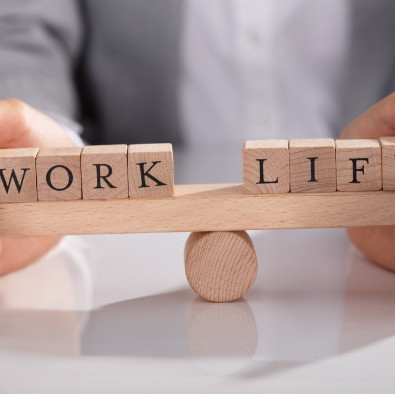Search vacancies

Introduction
The many benefits of striking an effective work-life balance cannot be ignored. Once considered an office buzzword, there is overwhelming evidence which supports the theory that everyone – no matter your age, gender or title, benefits from getting equal amounts of work, rest and play.
So why is it that men often get left out of conversations about work-life balance?
As employers strive to get their workforce to understand the importance of a healthy work-life balance, is the idea that it is somewhat inherently emasculating to look out for one’s physical and mental health creating a barrier between men and the work/life balance that they deserve?
In competitive sectors, working 50+ hours a week is sometimes worn as a badge of honour, but just how damaging is this culture of competitiveness in the workplace, and what can be done to make more men realise that conversations about work/life balance apply to them, too?
The Rise of Dual Career Couples
One of the ways in which both male and female roles have changed drastically in recent years is due to an increase in dual-career couples.
While once it was the norm for the man to be the breadwinner and the woman to stay at home and raise the children, this is no longer the case – the conventions have changed.
The Bureau of Labour Statistics in 2017 found that in 62% of married couples with children, both partners were in work, compared to 1967, where the number was just 44%. This means added pressures on both parties to be responsible not only for earning, but being active in raising children and both partaking in household duties; a task which can seem overwhelming for even the most organised individuals.
Continuing to work a ‘regular’ working week and adding on top the pressures of raising a family can produce an incredibly stressful environment. When one member of a couple is offered a promotion which would mean a relocation for the entire family or the possibility of one half of the couple having to work away from home, possibly overseas, for a period – this can be an incredibly difficult conversation to have if there has not been a prior discussion.
Women are now having children later in life, often due to career reasons. This has meant that as the parent approaches a time in their career where their promotion prospects are at their highest, their children are at crucial points in their education. It becomes an issue when both men and women in their 40s and 50s who are on the verge of really lucrative promotions are also needed by their family to support their children through GCSEs and the other struggles that come with raising teenagers.
Work-Life Balance for Better Mental Health
The data cannot be ignored – stress caused by overwork has been linked to anxiety, depression, sleep disorders, heart disease and even obesity.
However, since the introduction of the UK’s first ‘work-life balance’ initiative was launched in 2000, it appears that our jobs have only continued to cause increased stress for us year on year.
The UK mental health charity Mind found that over 1 in 3 (34%) of people stated that work was the most stressful factor in their lives, with financial problems and health tailing behind at 30% and 17% respectively.
There seems to be a belief that mental health problems are a ‘new’ illness, mainly facing younger generations who are constantly bombarded with cynical social media messages, but this is not the case. Charity Age UK in 2017 found that over half of adults aged 55 and over have experienced mental health problems; the difference it seems is that younger people are simply talking about it more.
Perhaps the most worrying statistic surrounding male mental health is the un-ignorable fact that suicide is the single biggest killer of men under 45. While this is an incredibly complex and sensitive subject and quite often we will never know the reasons behind individual cases, the link between depression and suicide is apparent – it is estimated that around 60% of people who commit suicide have a mood disorder.
While there has been an effort to increase awareness of mental health issues in general, an ACAS survey found that only 11% of people felt that they were able to discuss mental health issues with their line manager, and half of all managers said that they felt they needed more training on the matter.
So, despite there being a drive to increase public awareness of mental health problems, it seems we still have a long way to go in terms of workplace recognition of the importance of these issues.
Redressing the Balance
Talk to any company about their policies, and you will hear similar things – diversity and inclusion in the workplace are crucial, as well as creating a positive company culture and a great employee experience.
But how much of this is actioned, and how much is just for the blurb on the company website? The differences between the challenges men and women face in the workplace is huge, and despite the endeavour by many to erase gender differences in the workplace, it is apparent that we still have a long way to go.
For it to be effective, any scheme introduced by an employer to encourage employees, and specifically males, to ask for help or to take a step back when the pressure is building needs to be fully supported by the entire organisation with real actionable steps.
What Can Companies do to Encourage a Healthier Work-Life Balance for Men?
Companies who know they need to do better in addressing male mental health in the workplace should take action – simply posting a social media update on mental health awareness day is not enough.
The CIPD, together with Mind, have created the People Managers’ Guide to Mental Health, a comprehensive document comprising real-life scenarios and problem-solving advice for managers to apply to mental health-related issues in the workplace. While the guide is in no way gender-specific, it focuses on typically high-stress, male-dominated areas such as management.

Intrigued? Let’s talk
To find out how our tried, tested and trusted insight and innovation can deliver you the brightest sales and marketingtalent call
01905 381320 or email info@martinveasey.com.
Managers should be on the lookout for signs that a person (regardless of their gender) is struggling, but need to be mindful that men are far less likely to ask for help if they are.
For men with compounding stress in their work-life, Mind suggest the following -
-
Educate yourself on the early signs of stress and be on the lookout for them if you are in a high-pressured role.
-
Work out what are the things that cause you to feel stressed in the workplace, and talk to your employer about managing these situations. Even something as simple as going for a 5-minute walk outside can reduce a build-up of stress which is helpful in the long-run.
-
Look after your physical health – eat healthily and get ample exercise.
-
Balance your time – don’t respond to emails out of work hours – give yourself set ‘work’ and ‘personal’ hours.
-
Don’t expect perfection in everything you do.
-
Talk to someone you trust, be it your partner, a friend or even your human resources department if you feel your stress is becoming unmanageable.
Thanks,
Roheela
About Martin Veasey Talent Solutions
At Martin Veasey, we have been working with blue-chip and SME businesses for over 35 years, both in the UK and around the world.
We are an independent consultancy company with highly qualified staff, including many degree and Masters educated consultants, with memberships of professional bodies such as the Chartered Institute of Personnel and Development and the British Psychological Society.
We have unique expertise in hiring for senior roles in Board & Senior, Supply Chain & Logistics, Purchasing & Procurement, Manufacturing & Engineering, Pharmaceutical & Life Sciences, Sales, Human Resources, plus many more.
If you are looking to work with a highly accomplished recruiting partner, you can call us on 01905381320 or get in contact today.
Intrigued? Let’s talk
To find out how our tried, tested and trusted insight and innovation can deliver you the brightest sales and marketingtalent call
01905 381320 or email
info@martinveasey.com.
I am highly recommending any candidates to work with Martin Veasey Talent Solutions, as they understand the candidate career objectives and match the skills required with the desired employer.